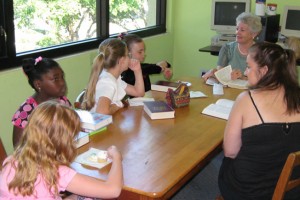 Are you aware that the optimum time for reaching children for Christ is between 8-12 years of age? This is the period when most children reach the“age of accountability—a time of life when one is aware enough of God to respond to Him” (Dr. William Hendricks in his book, A Theology for Children).
Are you aware that the optimum time for reaching children for Christ is between 8-12 years of age? This is the period when most children reach the“age of accountability—a time of life when one is aware enough of God to respond to Him” (Dr. William Hendricks in his book, A Theology for Children).
In the last decade, George Barna’s research revealed several supporting findings:
- By age nine a person’s moral foundations are in place. After age nine, most people simply refine their views.
- By age 12, many people have determined the personal significance of Christ’s death and resurrection.
- People who accept Christ before their teen years are more likely to remain committed Christians as adults.
- Consistently explaining and modeling biblical principles are critical factors in the spiritual development of children.
(From Barna’s 2003 book, Transforming Children into Spiritual Champions)
Sunday School teachers are in a unique position, along with parents, to consistently explain and model the biblical truths. For many children, the Sunday School teacher is their only source for hearing, understanding, observing a model. All of this underscores the importance of foundational teaching with preschoolers and children.
Here are a few tips for children’s Sunday School teachers as they deal with children and salvation…
- Treat each child and his decision individually.
- Avoid group appeals.
- Encourage children to express personal ideas and feelings.
- Involve parents.
- Listen carefully to the child’s questions and answers.
- Leave the door open for future conversations.
- Keep the conversation on the child’s level, and use the Bible.
- Follow-up.
- Talk with parents and offer assistance.
- Encourage children to make public their decision.
- Reassure children who are not ready.
_______________________
Marie Clark is the Bible-Teaching and Discipling Team Leader for the Kansas-Nebraska Convention of Southern Baptists. She has taught children in a variety of settings in her church and also directed a week-long children’s camp for more than 20 years.



